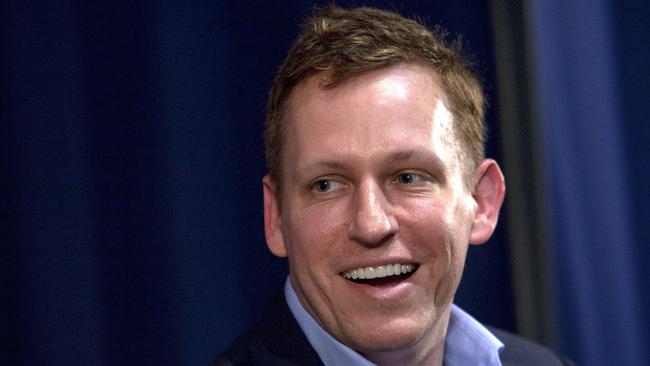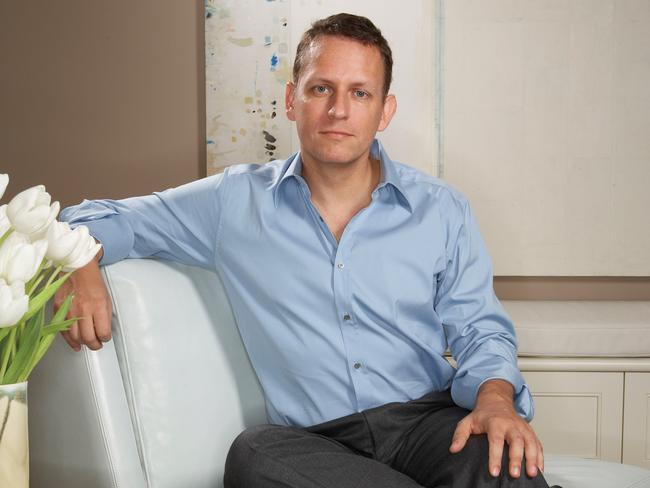What happened to teenagers paid to drop out of university?
FIVE years ago, entrepreneur Peter Thiel paid 24 teenagers $100,000 to drop out of uni and pursue their business ideas. This is where they ended up.

Careers
Don't miss out on the headlines from Careers. Followed categories will be added to My News.
HOW’S this for a proposition? A mega-rich American entrepreneur will give you $100,000 to drop out of university and pursue your dreams. Sound too good to be true?
Well, the co-founder of online payment system PayPal, Peter Thiel, has offered that very deal for the past five years.
In 2010, sensing a crippling stagnation in the US economy, he set up the Thiel Fellowship with the aim of giving youth a path to a successful career that sidestepped the need for a four-year university degree.
Mr Thiel, who was also one of the first investors in Facebook, said that university courses were stifling the potential of young entrepreneurs, while loading them up with a crippling amount of debt.
His foundation aimed to pay 20 teenagers a year to ditch their college course and pursue their own business idea.
Those selected are given invaluable connections and are guided by thinkers, investors, scientists, and businesspeople.
Mr Thiel’s generous offer sparked a national conversation in the US: Is college a waste of time and money?

Mr Thiel argues that university degrees can often be a poor investment for young people because they are too expensive, encourage conformity and fail to teach the entrepreneurial skills the business world requires.
He says that people feel a societal pressure to attend university if they want a successful career, but he is keen to free bright thinkers from this convention.
Speaking on a Reddit “Ask Me Anything” session, Mr Thiel said his foundation had been a success on because it had started an important debate about the “education bubble”.
“Student debt is over $1 trillion in this country, and much of that money has gone to pay for lies that people tell about how great the education they received was,” Mr Thiel said.
He has contrasted university campuses with the type of innovation found at Silicon Valley, the home of new technology in the US. Mr Thiel argues that Silicon Valley is bursting with the type of fresh ideas that are lacking in the higher education sector.
On the other hand, figures show that people who pursue tertiary education are on average much better off.
In his attempt to sell the federal government’s proposed shake-up of the higher education system in Australia, Education Minister Christopher Pyne has consistently reminded voters that university graduates on average earn 75 per cent more than school leavers over their lifetime.

So, who’s right? Does university make you better off overall, or should people think twice about taking on a degree?
An article in The Chronicle of Higher Education examined the Thiel Fellowship scheme this week and found it had produced mixed results.
The fellowship has taken on 83 participants since it was launched, including students from the US’s most prestigious universities, Harvard, Stanford, Yale, the Massachusetts Institute of Technology (MIT) and Princeton. The fellows have raised $72 million collectively and produced $29 million in revenue.
The Chronicle spoke to nine of the 24 entrepreneurs who took part in the first two-year program, and most reported that the experience was a positive one.
Many said the beauty of the program wasn’t the $100,000 boost but the networks they were introduced to.
But, crucially, a handful of them enrolled in university after they completed the program, which challenges the central idea of the fellowship.
John Marbach, for example, went back to Wake Forest University after one year of the program, citing that he felt out of touch with real people.
The success of the participants’ ventures has been patchy.
Andrew Hsu started Airy Labs, an educational gaming company that at one point employed more than 20 staff, but the company faltered within a year due to poor management, TechCrunch reports.
Many other fellows abandoned their initial ideas when they realised they were unviable and pursued other business concepts.

“Of those interviewed, all but one say they learned more about their abilities and the business world than if they had stayed in college,” the Chronicle reports.
“And though most found college socially and intellectually rewarding, few felt compelled to finish.”
Eden Full, who developed a successful device that provides cheap solar energy and clean water for developing nations, was representative of many of the fellows spoken to.
“Both my college education and my Thiel Fellowship experience were very valuable to me. I don’t think any less of one or the other,” she said. “But we need to encourage students that they can step off the conveyor belt whenever they want. I want to live my life as an example of that.”
Dale Stephens said he believed in a liberal arts education, but didn’t believe it needed to take four years.
“(The fellowship) sparked a national conversation about the return on investment of higher education,” he told the Chronicle.
“I think it’s going to benefit an entire generation of kids and put a thought in parents’ heads about how they’re spending money on their child’s future.”
Another fellow, Paul Gu, who established an online lending compwany that has attracted $6 million in investment, concluded that while university wasn’t the only path, it would have been difficult to build a company like his on his own.
“Most people would be better off going to college,” he said.
But, to give the last word to Mr Thiel, he told Reddit that “almost all of them did and learned far more than they would have in college”.
Originally published as What happened to teenagers paid to drop out of university?


